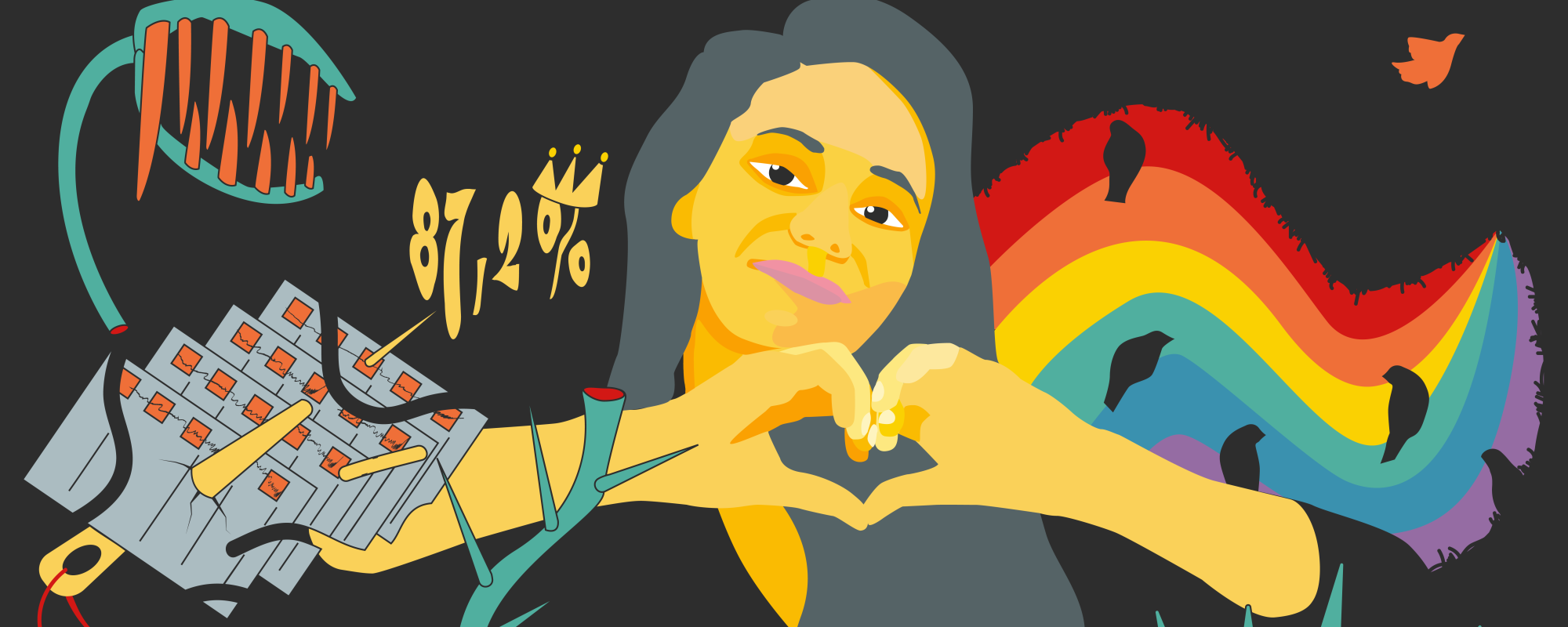Political pressure related to the presidential election, mass searches in artists’ homes, and the first reported criminal case of the 'extremist movement LGBT'. OVD-Info tells about these and some other key events of political repression in the March’s chronicle.
The topic of the month: Persecutions related to the presidential election

From 15 March to 17 March, an event called 'Election of the President of Russia' took place; according to the Central Election Committee of Russia, Vladimir Putin gained 87,2% of votes at this event. Alexei Navalny’s supporters called those Russians who oppose the current authorities to come to the polling stations on the last day at noon. In this connection, the prosecutor’s office issued a statement warning 'about the responsibility for violence of the electoral legislation'. A female student from Ulyanovsk (a city in Russia near the Volga river), who had claimed that 'a meeting of cool girls' would take place on 17 March at the polling stations, was fined under the article on organising unauthorised actions.
In Perm Krai (the region of Russia located near the Ural mountains), law enforcement officers searched the homes of activists. Three National Bolshevism supporters were arrested for picketing against the election.
In annexed Crimea, Dmitry Beloglazov was arrested for 20 days for eating a ballot paper. A resident of Bratsk (a city in Siberia) Alexander Schokhirev was beaten by law enforcement officers for 'a wrong vote' because of an anti-war inscription which he had allegedly written on the ballot. Later, Alexander was sentenced for administrative arrest.
In Kaliningrad (a city in the westernmost European part of Russia), law enforcement officers detained the election observer Olga Nedvetskaya; she was forcibly admitted to a psychiatric hospital. The woman was not allowed to see her lawyer. Vera Indienko, an observer from Moscow, was held in administrative arrest for two days because of her avatar with a white-blue-white jumper. The woman said that she was severely beaten at the police station.
Activists involved in collecting signatures in favour of Boris Nadezhdin also faced pressure. Members of the politician’s headquarters were searched in Stavropol Krai (a region in the south of Russia), Altai Krai (a region in Siberia), and Udmurtia (a region near the Ural mountains). Five supporters of the politician were subjected to administrative arrests in Primorsky Krai (1, 2). The head of Boris Nadezhdin’s Kaluga headquarters, Konstantin Larionov, was beaten and fined under articles on illegal production and placement of campaign materials and on interference in the work of the election commission.
Persecutions related to anti-war position


Journalist Roman Ivanov from the Moscow Region and poet Alexander Byvshev from Oryol (a city south of Moscow) were sentenced to seven years in prison, documentary filmmaker Vsevolod Korolyov from St. Petersburg to three years, and activist Mikhail Feldman from Kaliningrad to two years. All but Feldman (he was found guilty of repeatedly discrediting the army) were convicted under articles about 'fake facts' about the army.
Aleksandr Dimitrenko, a resident of Voronezh (a city near the Ukrainian border), who 'confessed' under torture to state treason and preparation of sabotage, has been sentenced to 23 years in prison. Polina Yevtushenko, a resident of Samara (a city on the Volga river), who was charged under six criminal articles, including preparation for state treason, faces up to 22.5 years in prison.
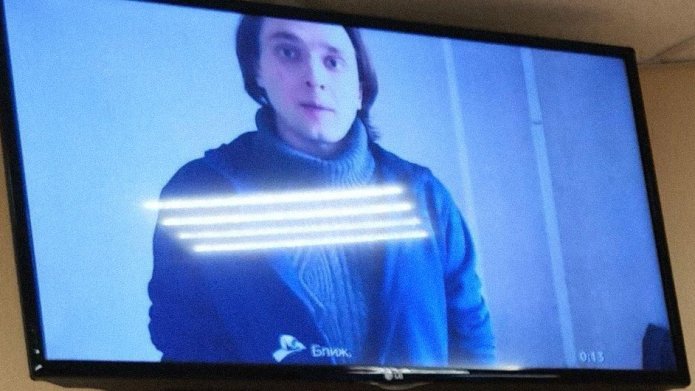
Pressure on convicts for their anti-war position in places of detention continues. Anton Zhuchkov, convicted in the case of intent to set fire to a police van, reported torture in the Krasnoyarsk pre-trial detention centre. Ludmila Razumova and Dmitry Ivanov, convicted in the 'fake facts' case, are regularly sent to a punishment cell; Aleksei Gorinov is again tortured by sleep deprivation, Gregory Winter was transferred to a cell with broken windows and is not provided with necessary medication.
Мass searches were conducted in connection with a case of state treason against Pyotr Verzilov, the former editor of Mediazona. In March, security officials came to at least 18 addresses of artists and activists of the whole country.
OVD-Info regularly updates the infographic devoted to people who are facing criminal prosecution because of their anti-war position.
Repressive rulemaking
Members of the Spravedlivaya Rossiya — Za pravdu [A Just Russia — For Truth] party introduced to the State Duma a draft of a law prohibiting all social associations having no registered legal entity and banning the participation of foreigners and people lacking citizenship in the creation of social associations.
In March, the state continued searching for ways to complicate the life of «foreign agents». The project of a law limiting the access to books written by 'foreign agents' was suggested to the State Duma. The parliament of Bashkortostan (a Russian republic between the Volga and the Ural Mountains) suggested limiting the rewarding of 'foreign agents' in commercial agreements with both private and legal entities to a minimum legal wage. The Federation Council approved the law prohibiting advertisement in resources of 'foreign agents' which was later signed by Putin.
'Foreign agents' and 'undesirable' organisations
'Foreign agents'

The criminal case of evading 'obligations imposed by the status of a foreign agent' was initiated against Buryat activist Evgeniya Baltatarova who had left Russia earlier and Sergei Piskunov, an already imprisoned ex-coordinator of the Kuzbass (Kemerovo region) department of Golos. The same article served as a reason to put out a search for Itil Temnaya, a LGBTQ-activist from Vladivostok. Ruslan Aisin, a political scientist from Tatarstan, is accused of violation of 'obligations imposed by the status of a foreign agent' and rehabilitation of nazism. As seen from the data of Roskomnadzor, criminal cases were initiated against 13 'foreign agents'; OVD-Info is aware of the names of eight of them.
Oleg Tinkov decided to terminate the activity of his leukaemia foundation because of his 'foreign agent' status. Tinkoff bank, founded by him and sold two years ago, cancelled automatic payments to the 'Nasiliu.net' [No to Violence] centre and charity foundation ‘Nuzhna pomosh’ [Need help]. During the first ten days after this foundation was included into the list of the Ministry of Justice, 63 non-commercial organisations have discontinued their agreements with it and 26 more requested to hide them from the list.
'Undesirable organisations'

There was a search at the apartment of Andrei Novashov, a journalist from the Kuzbass region judged under the article of military 'fake facts'. This search aimed to testify Novashov’s supposed collaboration with Radio Svoboda. A criminal case was initiated in Omsk (a city in Siberia) connected with the involvement in a religious organisation Allatra.
'Extremist' and 'terrorist' organisations


Nine Jehovah’s Witnesses from Irkutsk (a city in Siberia) were sentenced to three to seven years in prison; their faith ally from Maikop Inver Siyukhov was sentenced to six years’ imprisonment. It was reported that Aleksandar Chagan from Tolyatti was imprisoned for eight years at the end of February. The eldest of Witnesses prosecuted now, Yurii Yuskov, 85, was condemned to a suspended sentence.
After mass searches in Omsk, believers Leonid Pyzhov and Sergey Rygaev were sent to pre-trial detention. In Cherkessk (a city in the North Caucasus), Vladimir Fomin, who has a second-degree disability and lost consciousness in the courtroom, was remanded in custody. Dmitry Terebilov, who was already serving a sentence in a penal colony for his affiliation with Jehovah’s Witnesses, faced new charges after discussing faith with a cellmate.
In annexed Crimea, the case of four believers of this denomination has been sent for review. As a result, Pyotr Zhiltsov, Sergey Lyulin, and Taras Kuzio were released from pre-trial detention. In Kursk, Dmitry Chausov was transferred from pre-trial detention to house arrest, while his wife, Oksana Chausova, was placed under restrictions after being released from house arrest. Pavel Brilkov from Prokopyevsk had his forced labour replaced with a suspended sentence.
Several verdicts were issued due to involvement with other banned organisations. In Sakhalin, citizens of Kyrgyzstan Orunbek Orozbekov and Makmalbek Mazhitov were sentenced to six and two and a half years in prison, respectively, for their involvement with the Tablighi Jamaat case. In the Samara region, Sergey Patsanovsky and Olga Anufrieva were sentenced to three and four and a half years of imprisonment, respectively, in connection with the case of 'citizens of the USSR'. In Chelyabinsk, Vadim Nasyrov and Marat Bazarbayev were sentenced to 14 and 18 years of imprisonment, respectively, as members of the recognized «terrorist» party Hizb ut-Tahrir.
Six members of the Allah-Ayat religious group were detained in the Rostov region.
The prosecutor’s office demanded that the independent media project 'Omsk Civil Association' (OCA) be recognised as an 'extremist organisation'.
Persecutions of politicians, activists, and human rights defenders
Anarchist and mathematician Azat Miftakhov was sentenced to four years of strict regime with the first two and a half years to be served in prison for justifying terrorism: he was accused of discussing Mikhail Zhlobitsky with other inmates. The case of former Moscow district councillor Ketevan Kharaidze was sent for retrial by the cassation instance. Earlier, the 64-year-old woman was sentenced to four years in prison for fraud after a conflict with a developer.
Defendants in the case of the Telegram channel 'Chto-Delat! ' [What-to-Do!] were sentenced to real prison terms ranging from five to eight years: they were found guilty of inciting mass riots and inciting hatred by an organised group. The activist Igor Kuznetsov, involved in this case, was also sentenced to three years of probation for his involvement in the 'Left Resistance' organisation.
On 31 October 2018, the anarchist Mikhail Zhlobitsky detonated a bomb in the building of the Office of the Federal Security Service in the city of Arkhangelsk. Three FSB officers were injured, Zhlobitsky died. Law enforcement officers qualified the incident as a terrorist attack. Following that, law enforcement officers across the country began opening cases of justification of terrorism against those who spoke about the incident on social media.
Prosecutors demanded a 10-year sentence for Sergey Legkobitov, an eco-activist from Pyatigorsk, in a bribery case, while Natalia Garyaeva, an eco-activist from the village of Poltavskaya, was ordered to pay 250,000 roubles (US$ 2,715) in damages in a defamation lawsuit brought by a deputy—the father of one of the co-owners of the landfill she opposes. Tatyana Kotlyar, a human rights defender from Obninsk assisting migrants, was fined 450,000 roubles (US$ 4,892) once again in a case of a 'rubber apartment' (a term used to describe accommodation where large numbers of migrants are formally registered — OVD-Info).
In Karelia, FSB officers killed Belarusian activist Mikalai Alekseiou, claiming that he was a member of the Kastus Kalinouski regiment and was preparing a terrorist act.
Massive searches took place in the case of state treason against former Mediazona publisher Pyotr Verzilov: law enforcers went to at least 18 addresses of artists and activists across the country in March.
Pressure on Navalny’s supporters

It was demanded that the sentence of Lilia Chanysheva, ex-head of Navalny’s headquarters in Ufa, be increased to 10 years in the colony. In April, the court increased her sentence from seven and a half to nine and a half years in a penal colony. The activist Ruslan Mulyukov, who is on the same trial with her, was also kept in the colony despite his Group I disability. Alina Olekhnovich, a student of the Higher School of Economics, and Ivan Trofimov, a graduate of the university, were sentenced to three and a half years in the colony in the case of Navalny’s 'underground headquarters'.
Two journalists, Antonina Favorskaya in Moscow and Olga Komleva in Ufa, were sent to pre-trial detention centres as suspects in the case of an extremist community against Navalny’s supporters. The regional Interior Ministry has regularly sued Komleva, demanding compensation for her work at pro-Navalny rallies. Favorskaya covered court hearings involving the politician.
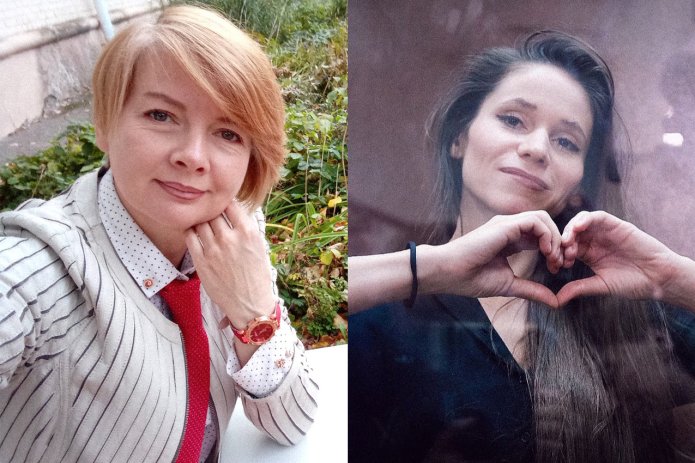
Marina-Viktoriya Nagornykh, a Murmansk resident, was arrested three times for seven days because of the picket she held on the day of the politician’s murder: in particular, because the court considered the very name 'Navalny' to be a symbol of an extremist organisation. Alexander Donets, a resident of Dmitrov (Moscow Region), was arrested for three days because of a memorial to the politician. Donets’s wife and human rights defender Vladimir Zhilkin, who came to his aid, were shoved into the boot of their car by law enforcers during the arrest.
Unidentified people attacked Alexei Navalny’s associate Leonid Volkov in Vilnius; the man was admitted to hospital with multiple injuries. The Lithuanian State Security Department said that the attack could have been organised from Russia.
Persecution related to freedom of speech
Administrative prosecutions
In March, the reasons for administrative prosecutions under articles restricting freedom of expression were, among others:
- Alexei Navalny’s face and surname (courts have issued such rulings, for example, in Murmansk, Moscow and Novy Urengoy);
- wi-fi 'Glory to Ukraine' (an MSU student who named his personal network this way was expelled from the university);
- Facebook logos on the websites of kindergartens in Yugra;
- the inscription 'Putin — to the hell' on the voter list;
- a blue and yellow forget-me-not on the bag.
In addition, in Kamensk-Uralsky, police officers were concerned about the blue stripe in the cab of a local resident’s lorry: they saw a white-blue-white flag in it. The man was fined, but confiscation of the vehicle was avoided: some 'special service' promptly added a red stripe to the blue one.
Persecution of bloggers and journalists
Askhabali Alibekov, the owner of a 'Dikiy Desantnik' [Wild Paratrooper] YouTube channel, is facing a criminal case for assaulting a police officer after an incident where law enforcement officers beat him during his apprehension. Alibekov had been released from a penal colony in November having served time for discrediting the Russian army.
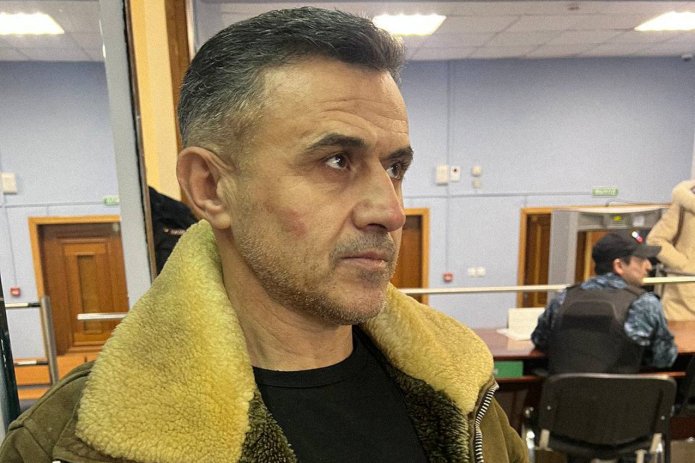
Sergey Kustov, the chief editor of 'Bars' TV channel, was detained for ten days for disobedience to military police while covering the IL-76 crash site in the Ivanovo Region.
Spanish journalist Javier Kolas was denied an extension of his Russian visa. Previously he was requested to cease covering protests led by wives of mobilised soldiers. Journalists Matvey Kurdyukov and Sergey Podsytnik from the 'Protokol' newspaper, who had emigrated from Russia earlier, noticed surveillance while in Germany.
Cases of incitement to terrorism, extremism and anti-state activities

A comment regarding Putin’s visit to annexed Crimea, beginning with the phrase 'There can be found a good…' led to a man from Saint-Petersburg being fined under an article about justification of terrorism. Blogger Nikolay Farafonov from the Komi Republic was sentenced to six years in a penal colony for inciting the arson of military offices.
An 18-year old resident of Bashkortostan was sentenced to five years in a penal colony for participating in a discussion on VKontakte about the American school shooting at Columbine High School.
Cases of rehabilitation of Nazism and desecration of soldiers’ graves
A criminal case on rehabilitating Nazism was initiated against a 16-year-old student in Saint-Petersburg for conducting a 'social experiment' which involved shouting 'Heil Hitler' in a shopping centre. Charges on the same article were brought against a Moscow citizen (who painted over a portrait of a veteran in a park) and a Tambov resident Andrey Polyakov (who proposed to call a 'special military operation [SVO] heroes' — 'SVOlochi' [bastards]).
Four teenagers from Ufa are being charged with desecration of a burial place for extinguishing an Eternal flame. In Nevinnomyssk, videos of the same monument have resulted in three people facing criminal charges.
Persecution related to freedom of assembly
In March, law enforcement officers detained Russian citizens who participated in solitary protests supporting political prisoners, protesting against pollution, and proposing joining NATO. Meanwhile, authorities denied authorisation for events commemorating the Emancipation reform, in memory of Boris Nemtsov, and against domestic violence.
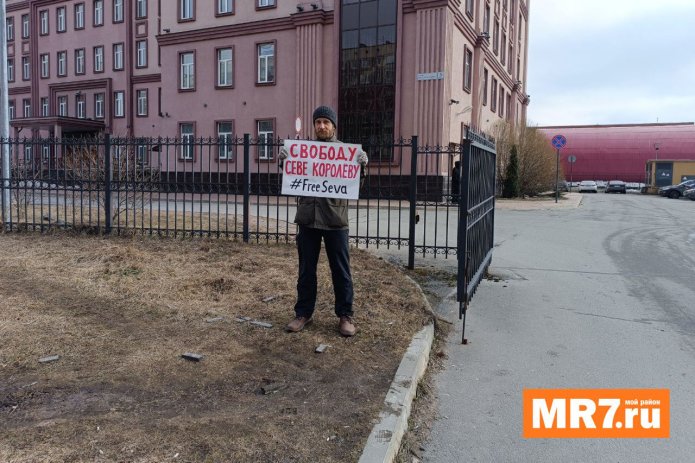
Baymak protests case

 280 administrative cases under the «protest article» were submitted to the courts in Bashkortostan by the end of March 2024 (out of 381 across all of Russia)» data-entity-type="file» data-entity-uuid="6052eb81-960b-4e23-bebf-1c17b68c2ef1» src="/sites/default/files/inline-images/Frame 750RUS.png» />
280 administrative cases under the «protest article» were submitted to the courts in Bashkortostan by the end of March 2024 (out of 381 across all of Russia)» data-entity-type="file» data-entity-uuid="6052eb81-960b-4e23-bebf-1c17b68c2ef1» src="/sites/default/files/inline-images/Frame 750RUS.png» />
Bashkortostan’s local residents continue to be persecuted in connection with the case related to the rally in support of a local activist Fail Alsynov, who was sentenced to actual imprisonment in January for participating in a rally in defence of the environment. Some of the defendants in the case have already been charged (1, 2, 3).
Activists who supported the protest also faced pressure from the authorities: thus, Tansulpan Burakaeva who was selling postcards in support of those detained in the 'Baymak case, ' had her shop lease terminated at the Art-KVADRAT centre. The artist was advised to support political prisoners in a «neutral place».
Pressure on LGBTQ-community

The first criminal case regarding an 'LGBT extremist organisation' has been initiated in Russia — in Orenburg, the art director, administrator, and owner of the 'Pose' club were sent to pre-trial detention. Prior to this, law enforcement conducted a raid in the bar, the video of which was posted by members of the pro-government movement 'Russian Community of Orenburg'. Visitors in the video were humiliated and asked what they were doing in the 'faggot club'.
Besides that, LGBTQ-activist Yaroslav Sirotkin from Yaroslavl has been declared wanted under an unspecified article of the Penal Code.
Administrative prosecutions continued under articles related to LGBT propaganda and the demonstration of «non-traditional» relationships to children. The online cinema 'OKKO' was fined one million rubles (US$ 10,850): a series on this platform featured «inappropriate scenes where one woman tenderly strokes the hand of another». Fines were imposed on the Krasnoyarsk bar 'Elton', a resident of Zelenograd who complained to the prosecutor’s office, blogger crazysuka who participated in Nastya Ivleeva’s 'almost naked party', and young women from Krasnodar who exchanged rings.
Repressions against local residents of annexed Crimea

Russian security forces searched 10 addresses in annexed Crimea. Rustem Osmanov, Memet Lyumanov, Aziz Azizov, and Mustafa Abduramanov were sent to pre-trial detention on a new case related to Hizb ut-Tahrir, while Remzi Kurtnesirov was placed under house arrest.
Tofik Abdulgaziev who is serving a 12-years prison sentence was admitted to intensive care in critical condition. Amet Suleymanov who is suffering from heart failure was denied release on health grounds. Other convicts in cases related to Hizb ut-Tahrir among Crimean Tatars, Teymur Abdullaev and Server Zekiryayev, are regularly placed in disciplinary isolation units.
Oleg Prykhodko, a Crimean resident, had his sentence reduced by one month to four years and five months in a new verdict. Ivan Fisin was detained on charges of insulting the feelings of Orthodox believers. Edem Dudakov, a member of the Revision Commission of the Kurultay of the Crimean Tatar people, was searched.



